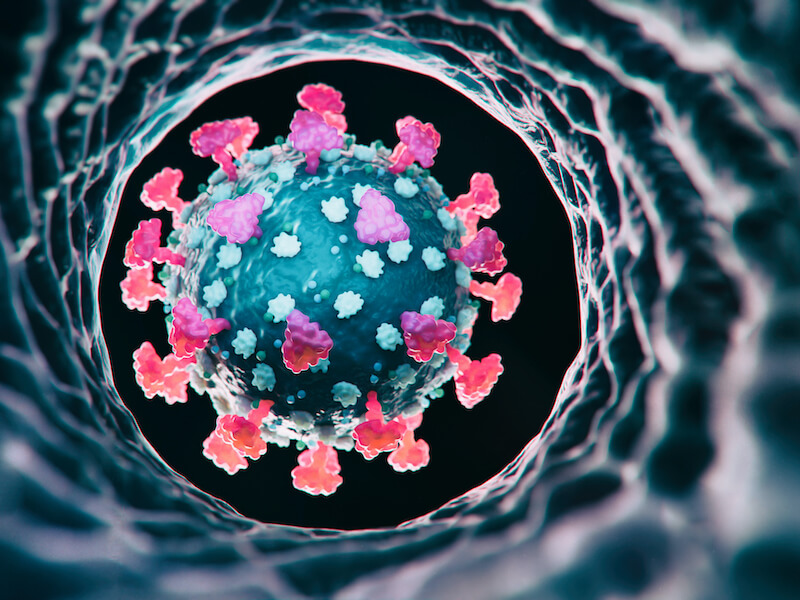
You might develop hearing loss as you get older, particularly if you frequently expose yourself to loud noise. Likewise, if you work on a busy factory floor and don’t wear hearing protection, hearing loss may be in your future. These hearing loss causes are pretty common. But there’s a new fighter in the ring, and you can most likely guess who it is: Covid-19.
People across the world have been ravaged by all of the numerous symptoms and side-effects of Covid-19, and that may include problems with hearing.
Maybe? Probably? Okay, Covid-19 is still a very new virus. And something new about it is being uncovered constantly by scientists. There is some research which indicates that hearing loss may be a potential side effect of Covid-19, but more research still needs to be done to back this up. So let’s have a look at where things stand currently.
So can hearing loss be triggered by Covid-19?
So here’s the first thing to remember: There’s utterly no evidence that the Covid-19 vaccine causes hearing loss. That’s true for all of the currently approved and obtainable vaccines, from Pfizer and Moderna to Novovax. Vaccines don’t impact your ears, they just don’t work that way. It would be like blaming your diabetes on the salad you had for dinner.
This is true of both the conventional vaccines and the new mRNA vaccines. Which means that the benefits of these vaccines still greatly outweigh the risks for most people. Talk with your doctor and seek reputable information if you have any questions about vaccines.
Let’s discuss hearing loss now that we’ve gotten that out of the way.
So how is hearing loss triggered by Covid?
But, how can this cause hearing loss? Particularly, how does this lead to sensorineural hearing loss, the type of hearing loss that results from damage to your auditory system and is usually permanent?
Well, there are a couple of hypotheses. Either one of them could cause hearing loss or both together.
Theory #1: inflammation
The first substantial theory among researchers is that Covid-19 causes considerable inflammation in the upper respiratory tract, and that this inflammation can ultimately impact your ears. After all, your nose, mouth, and ears are all linked. This may result in hearing loss in a couple of ways:
- Fluid buildup: Fluid has a more difficult time draining because inflammation has made the drainage channels more narrow. It becomes harder and harder to hear as this fluid continues to build up. After the symptoms clear up, your hearing will normally return to normal (this would not be an example of sensorineural hearing loss).
- Cell damage: Remember that viruses utilize your body’s own cells to reproduce. This can cause damage. And because Covid affects your vascular system, this can sometimes lead to damage to the vascular links between your ears and your brain. This situation is sensorineural hearing loss and will be generally irreversible.
When hearing loss is a result of a buildup due to inflammation, steroids can often help. There’s still an ongoing effort by scientists to discover a way to prevent sensorineural hearing loss. It’s not clear, based on this research, exactly how much protection vaccines give you against this kind of damage, but it seems obvious that it’s better than no protection.
Theory #2: Long Covid
The next theory is more significant in regards to patients’ experience, but a little less understood with regards to cause and effect. There’s something called Long Covid which you, by now, have probably heard about.
People will go through symptoms of Covid when they are dealing with Long Covid, long after they have recovered from the actual virus. Often, a debilitating bout of long Covid that drags out for months, or longer, after having Covid itself, is experienced. There’s no doubt, Long Covid is real, but scientists still aren’t sure why.
In February of 2021, scientists published a systematic review that looked at data about long-term auditory problems resulting from Covid-19. The review found that:
- 7.2% of people reported vertigo
- 14.8% reported developing tinnitus
- 7.6% of people reported hearing loss after becoming ill with Covid.
Whether these auditory difficulties are caused by Long Covid or just in relation to it isn’t really clear, but it’s safe to say there’s some kind of relationship. Long covid seems to trigger a broad constellation of symptoms, including those that affect your hearing.
Evidence or anecdote?
It’s anecdotal when somebody says that their hearing hasn’t been the same since they got Covid. It’s one single story. When researchers are trying to come up with a treatment strategy, these personal stories, while they are part of everyday life for the individuals, aren’t enough for scientists to go on. That’s why research is so crucial.
Researchers will be able to get a better understanding about the hazards of Covid as they accumulate more information about how extensive these difficulties are.
We undoubtedly have to understand more. Research is ongoing, which means the connection between Covid-19 and hearing loss isn’t actually proven or unproven. It’s important to get help as soon as you can regardless of how your hearing loss developed. So if you think your hearing isn’t what it once was, give us a call to schedule an appointment.
References
https://www.frontiersin.org/articles/10.3389/fneur.2022.883749/full
https://www.tandfonline.com/doi/abs/10.1080/14992027.2021.1896793?journalCode=iija20&